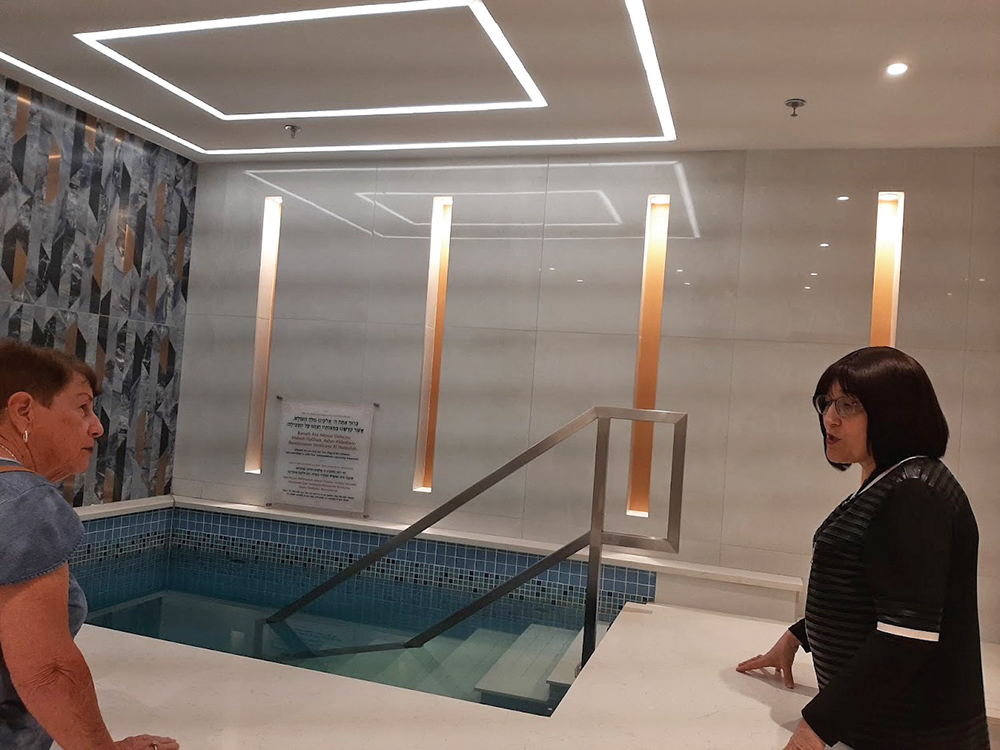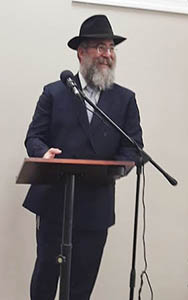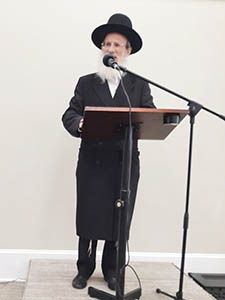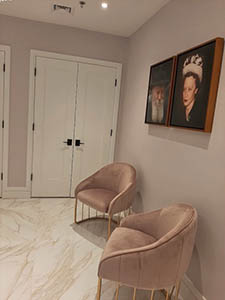
It all began with a dream Rabbi Yehuda Spritzer’s brother-in-law had that he should give money to establish a kosher mikvah.
With that he decided to give $200 to Rabbi Spritzer, the executive director of Chabad House in Monroe, New Jersey.
“Little did we know that would start what we have here today,” Rabbi Spritzer told the crowd of 125 men and women gathered on Aug. 27 at the Applegarth Road Chabad for the grand opening luncheon of Monroe’s first mikvah.
The $250,000 mikvah was built with funds raised through a local fundraising campaign and the assistance of Brooklyn-based Mikvah USA. The years-long project also involved securing the proper building permits from the township for the approximately 1,000-square-foot structure located beneath Chabad House. Rabbi Spritzer noted he had been congratulated by a township official upon recently receiving a certificate of occupancy for the structure for having the longest open application in township history.
Rabbi Yitzchok Bistritzky, who founded Brooklyn-based Mikvah USA in 2004, told the gathering the mikvah would “turn up the lights in hearts and souls” and deepen “our connection to Hashem.”
Despite the wait, the gleaming new mikvah with its modern fixtures, tiles and mosaic walls drew groups of curious attendees, some of whom had never before seen a mikvah. Their questions were answered by Dina Rosenfeld, editor-in-chief of Hachai Publishing and author of 18 children’s books, who was also guest speaker at the luncheon. During small group tours of the mikvah she fielded queries on everything from how the rainwater is collected, its filtration system, the role of the aide, and the exact procedure followed once immersed in its waters.
“The resurgence of mikvah has been an unexpected blessing,” said Rosenfeld of Borough Park, Brooklyn, who described herself as a “first generation mikvah user.” She explained she decided to become a mikvah tour volunteer as a young married woman as a way to meet other young married women. After all, as a preschool teacher she was used to giving concise answers.
“For the next 10 years I never met a married woman,” she said, but rather ended up giving tours to groups of teens from all streams of Judaism.
Rosenfeld, in fact, believes informing youths about mikvah will fill a gap in knowledge about mikvahs and their use in the Jewish community. “Kids go to Hebrew school and learn all about the mitzvot for children,” she explained. “But mikvah is for adults so it disappeared from the Jewish lexicon.”
Rosenfeld asked those in attendance if they knew the purpose of mikvah. Many knew that a woman uses it monthly and others called out its use for converts and to kosher dishes. “When something spiritual is about to take place it is a lovely custom for men to use the mikvah,” said Rosenfeld, citing such examples as before putting on tefillin or before the High Holidays.
Noting certain bodies of water such as oceans and certain rivers can be used for mikvahs if one is not available because they have flowing water from a natural source, Rosenfeld said most of the people in the room had ancestors who “broke through the ice” in Russia or other such places to keep mikvah.
According to Rosenfeld, the science and acts surrounding a kosher mikvah are “pretty complicated,” but its role as a source of renewal and transformation is not. “The transformation takes place in just a few minutes,” said Rosenfeld. “The power of mikvah is unique. When a woman uses it, it is a holy privilege she does for herself and her family.”
Describing Judaism and its emphasis on mitzvot as a “team sport” where everyone has a role to play, Rosenfeld added that even “the biggest rabbi in the world” cannot be fully mitzvah compliant without his wife and her observance of the mitzvah of mikvah.
Beyond the religious requirement, following the mikvah requirements is an act of love for a spouse and “an embrace of the divine.” Men often turn “mikvah night,” when they can resume relations into a “date night,” cooking dinner and buying flowers for their wives, she pointed out.
“Women who keep mikvah are very passionate about it,” said Rosenfeld, who said it was her hope that mikvah could be viewed as not just as something for the Orthodox and Hasidic communities. “When I take women through and tell them about mikvah I feel as if I’m continuing Jewish tradition.”
Debra Rubin is a staff writer at The Jewish Link.












